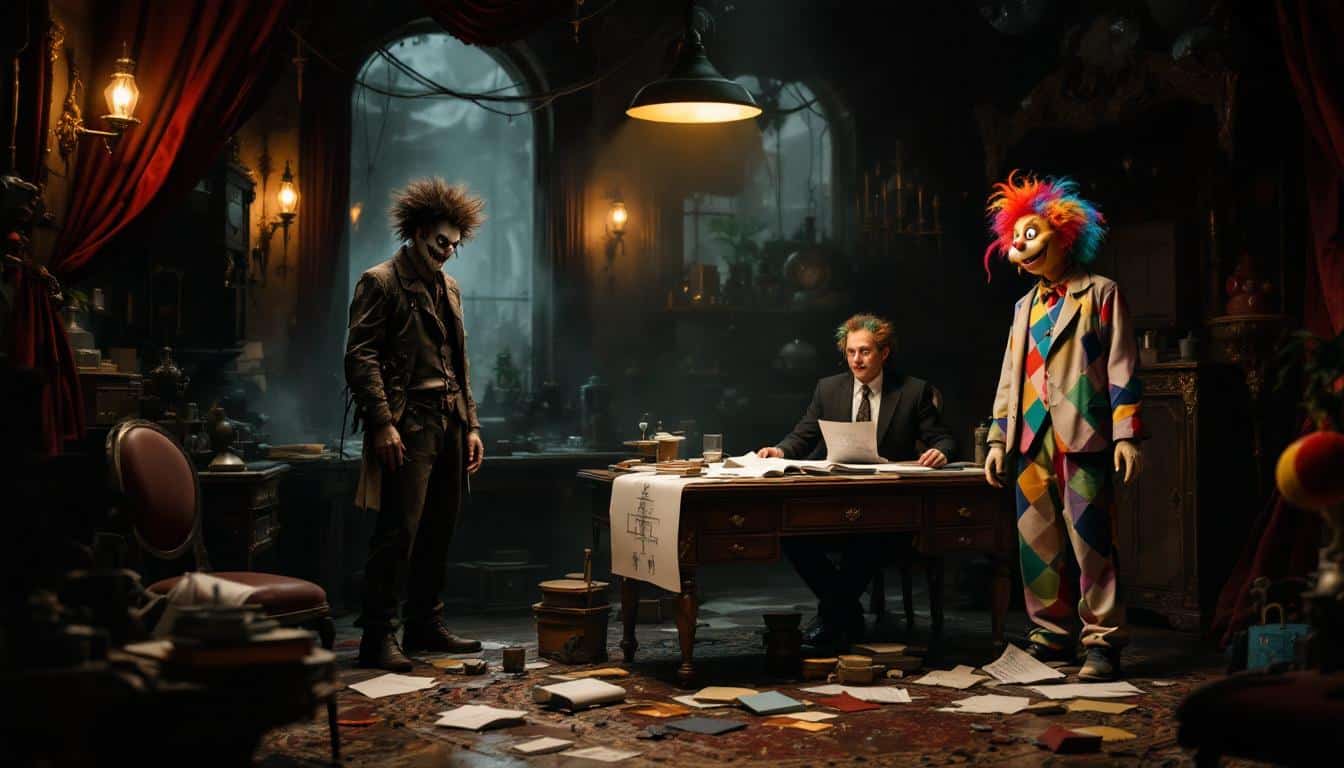“`html
Diving into the universe of Bad and Crazy is an intense and captivating experience.
This series skillfully blends crime drama, psychological horror, and comedy, creating a whirlwind of emotions and complex characters.
Each episode immerses you in raw chaos where moral ambiguity reigns supreme.
The characters are so vivid and flawed that they almost seem palpable, making their dysfunction almost tangible. Analyzing their personality types according to the Myers-Briggs® allows for a better understanding of what motivates them and how they interact. Let’s explore these fascinating personalities together and uncover the springs that make them move.
Ryu Soo-Yeol: ENTJ
Ryu Soo-Yeol is the kind of police officer capable of manipulating his conscience while climbing the ranks. Intelligent and calculating, he doesn’t hesitate to bend a few rules to achieve his goals faster. In an environment where connections take precedence over truth, Soo-Yeol plays the game until everything collapses. His ambition is both a dangerous force and a powerful driver that could propel him to uncharted heights if he knows how to channel it properly.
K: ESTP
K bursts into life like a whirlwind of bravery and instinct. A fearless biker clad in a red and black jacket, he acts without hesitation, ready to break a jaw or save a life in a single motion. K is not one to plan; he lives according to adrenaline highs and split-second decisions that can change everything. His magnetic charm and ability to react instantly make him an unpredictable but indispensable ally.
Boss Yong: INTJ
Boss Yong is the omnipresent shadow, the puppet master pulling the strings behind every intrigue. This woman can savor a gourmet meal with a politician while planning a murder as if she were choosing an appetizer. Her mind is a labyrinth of connections where no detail is too small, and every action is part of a larger strategy of power and control. As an INTJ, she remains impassive, always three steps ahead, manipulating the game at her leisure with apparent ease.
Oh Kyeong-tae: INFJ
Oh Kyeong-tae is the moral compass at the heart of this tumultuous story. A strict and devoted police officer, he adheres to the rules to the letter while having a heart of iron and a deep compassion for those he serves. His idealism and unwavering faith in justice set him apart in a world where cynicism is common. Kyeong-tae embodies integrity, making difficult choices to protect the innocent, even when it puts him in danger.
Shin Ju-Hyeok: INFJ
Shin Ju-Hyeok is the therapist who truly makes you feel understood, as if he holds a mirror to your soul. Calm and thoughtful, he always seems to know what to say to soothe and unsettle at the same time. Beneath this gentle facade lies a disturbing ability to analyze and manipulate, turning vulnerability into an opportunity for control. As an INFJ, he perceives emotional nuances with disconcerting precision, using this intelligence to subtly influence those around him.
Lee Hui-Gyeom: ISTP
Lee Hui-Gyeom is the ace of the narcotics unit, a force of nature driven by an unwavering sense of justice and a swift reaction capability. Determined and pragmatic, she approaches each investigation with analytical logic and formidable efficiency. Her tactical mind, combined with impressive physical energy, makes her an indispensable ally in the most tense situations.
Yang Jae-Seon: ENFP
Yang Jae-Seon turns every investigation into a noble mission and a mischievous adventure. A junior detective full of fresh ideas, he battles the moral abyss of Soo-Yeol with contagious optimism and overflowing creativity. His extraverted intuition allows him to see angles that others miss, making him the vibrant heart and inspiring soul of the team.
Ryu Dong-Yeol: ESFP
Ryu Dong-Yeol, Soo-Yeol’s younger brother, is the joyful and impulsive soul of the family. Always ready for a joke or an adventure, he lives fully in the present moment thanks to his sharp sense of action. Behind his antics lies an unwavering loyalty to his family, ready to do anything to protect them with a smile and boundless energy.
Andrei: ISTP
Andrei is the silent storm in Boss Yong’s arsenal, a man of few words and swift actions. With a cold efficiency, he handles threats without hesitation, using his analytical thinking to defuse the most perilous situations. His sense of the present makes him as deadly as he is invisible, embodying precision and lethality in any circumstance.
Kim Gye-Sik: ESTJ
Kim Gye-Sik is the unyielding leader of the team, ensuring that every operation goes smoothly. Rigorous and organized, he makes sure every detail is accounted for and every mission is accomplished. His commanding presence and strategic mind make him the pillar the team can always rely on, even in the most chaotic moments.
Seungsuk Seo: Introversion and Feeling Preferences
Seungsuk Seo is the cornerstone of the family, maintaining unity through acts of discreet kindness and an unwavering faith in her children. She protects her sons with a silent grace, hiding her own pains to offer them a warm and reassuring refuge. In a story filled with shadows, she is the gentle light that reminds us that, despite the falls, home is always a haven of peace.
Yeom Geun-soo: ENFP or ESFP
Yeom Geun-soo is that eccentric therapist who always seems a step away from resolving your deepest pains or offering you a drink to lighten the mood. A former renowned psychiatrist, he now runs a rundown counseling center with a jovial energy and an insatiable curiosity. Whether genuinely helping or simply participating in Soo-Yeol’s psychological chaos, Geun-soo brings an essential spark in the darkest moments.
What do you think?
Do you agree or disagree with these analyses of the characters’ personality types? Share your thoughts in the comments!
Other Articles You Might Enjoy:
- Here is the Studio Ghibli character you would be, based on your Enneagram type
- The Myers-Briggs® personality types of Squid Game characters
- The Myers-Briggs® personality types of The Thunderbolt characters
- The Myers-Briggs® personality types of Tokyo Revengers characters
- The Myers-Briggs® personality types of Jujutsu Kaisen characters
- The Myers-Briggs® personality types of My Hero Academia characters
- The Myers-Briggs® personality types of Peaky Blinders characters
- 8 introverted fictional characters and what we can learn from them

The discovery of the Myers-Briggs® personality types of the crazy and evil characters allows for an in-depth analysis of the motivations and behaviors of these complex figures. Using the MBTI, one can identify the distinctive traits that make these characters so intriguing and often unpredictable. For example, an evil character might turn out to be an INTJ with a cold, calculated strategy, while a “crazy” character might correspond to an ENFP characterized by impulsive actions and chaotic creativity.
This approach offers a new perspective for understanding narrative dynamics, revealing how personality types influence character interactions and development arcs. By highlighting these aspects, creators and readers can appreciate the psychological depth and emotional intricacies that make these characters memorable and often feared. Furthermore, this analysis contributes to a better story construction, allowing for the incorporation of diverse personalities that enrich the plot and stimulate audience engagement.

The discovery of the Myers-Briggs® personality types offers a fascinating perspective for analyzing crazy and evil characters in works of fiction. By understanding their personality type, we can better grasp their motivations, actions, and complexity. This analysis also helps in making characters more realistic and nuanced, thereby avoiding simplistic stereotypes. Through this exploration, we will delve into the different categories of MBTI® and discover how they manifest in characters typically deemed crazy or malevolent. Whether you are a fan of series like *Bad and Crazy* or a psychology enthusiast, this article invites you to reflect deeply on the personality of antagonists.
Understanding MBTI® and Its Importance
The Myers-Briggs Type Indicator (MBTI®) is a psychological tool that categorizes individuals into 16 distinct personality types. This indicator is widely used to understand people’s behavioral and cognitive preferences. In the context of fiction, the MBTI® allows for a breakdown of character traits and an analysis of their psychological depth. For example, in this article, the reliability of personality tests like the MBTI® is discussed. Understanding these types helps creators design more credible and engaging characters while offering viewers a better understanding of narrative dynamics.
ENTJs: Ruthless Leaders
ENTJ-type characters are often perceived as natural, charismatic, and determined leaders. In *Bad and Crazy*, Ryu Soo-Yeol perfectly embodies this personality type. ENTJs are known for their ability to plan and execute complex strategies, even if it involves bending the established rules. Their limitless ambition and desire for success can make them ruthless and morally ambiguous. This complexity is what makes the evil characters of this type so interesting to analyze. For an in-depth exploration of MBTI® types, check out this article.
ESTPs: The Embodiment of Adrenaline
ESTPs are often represented as impulsive, dynamic, and bold characters. K, in *Bad and Crazy*, is an emblematic example of this type. ESTPs live in the moment, guided by their sense of adrenaline and instinct. Their tendency to take risks and act without thinking can make them unpredictable and sometimes dangerous. This spontaneity brings a dimension of controlled madness that perfectly juxtaposes the rationality of ENTJs. Analyzing personality types helps to understand the deep motivations of these characters and their impact on the plot.
INTJs: Dark Strategists
INTJ characters are often brilliant strategists, planning their moves with surgical precision. Boss Yong, the antagonist of *Bad and Crazy*, is a perfect example of this type. INTJs are characterized by their Introverted Intuition (Ni), enabling them to see patterns and forecast long-term outcomes. Their ability to manipulate situations and control others makes them formidable antagonists. Their long-term vision and desire for perfection can lead them to morally ambiguous actions, adding psychological depth to their character.
INFJs: Complex Moral Guardians
INFJs are often perceived as idealistic and empathetic individuals, but they can also hide complexities and internal contradictions. Oh Kyeong-tae, in *Bad and Crazy*, well illustrates this type. INFJs are motivated by a strong morality and a desire to protect the innocent, even if it means making difficult compromises. Their Introverted Intuition combined with an Extraverted Feeling (Fe) makes them sensitive to the emotions of others, but also vulnerable to moral dilemmas. This duality makes INFJ characters particularly interesting to analyze within the context of psychological narratives.
ISTPs: Tactical and Relentless Masters
ISTPs are known for their ability to stay calm and effective under pressure. Lee Hui-Gyeom, one of the characters in *Bad and Crazy*, is a perfect example. ISTPs are pragmatic problem solvers, capable of adapting quickly to changing situations thanks to their Extraverted Sensing (Se). Their logical approach and Introverted Thinking (Ti) allow them to defuse crises with formidable efficiency. In antagonist or protector roles, ISTPs bring a dimension of rigor and determination that enhances dramatic tension.
ENFPs & ESFPs: The Duality of Passion and Action
ENFPs and ESFPs bring vibrant energy and undeniable spontaneity to narratives. Yang Jae-Seon and Yeom Geun-soo from *Bad and Crazy* are typical examples of these types. ENFPs are creative and idealistic, seeking to inspire and motivate others. In contrast, ESFPs are more action-oriented and focused on instant pleasure. Their presence adds a dynamic of organized chaos and charisma that contrasts with the more serious or malevolent characters. This duality enriches the storytelling by offering complex and unpredictable interactions.
Critiques and Limitations of MBTI®
Although the MBTI® is a popular tool for personality analysis, it is not without criticism. Some experts question its scientific validity and universal applicability. Recent studies suggest that the MBTI® may sometimes oversimplify or stereotype individuals. Moreover, the rigidity of types does not always capture human complexity and behavioral nuances. Therefore, it is essential to approach this typology with some flexibility and recognize its limitations when analyzing fictional characters.
Applications of MBTI® in Character Analysis
The application of MBTI® in character analysis allows for the identification of recurring patterns and interesting internal dynamics. By identifying the personality type of antagonists, content creators can develop more coherent and engaging narrative arcs. For instance, understanding that Ryu Soo-Yeol is an ENTJ allows for predictions of his strategies and relationships with other characters. Similarly, analyzing K as an ESTP helps to anticipate his impulsive actions and impact on the plot. To delve deeper into this analysis, visit this resource.

“`html
FAQ
Q: What is the Myers-Briggs® Type Indicator (MBTI) and how is it used to analyze characters?
A: The Myers-Briggs® Type Indicator (MBTI) is a psychological typing tool that categorizes individuals into 16 different personality types. In character analysis, the MBTI allows for a better understanding of their motivations, behaviors, and interactions by identifying their natural preferences for perception and decision-making.
Q: Why is it interesting to study the personality types of characters considered crazy or malevolent?
A: Studying the personality types of crazy or malevolent characters allows for a better grasp of the psychological dynamics that motivate them. It offers a deeper perspective on their actions and relationships with other characters, thereby enriching the plot.
Q: Which MBTI personality types are often associated with antagonists in narratives?
A: Antagonists are often associated with personality types such as ENTJ, INTJ, ESTP, or ENFP. These types are characterized by traits such as ambition, strategy, impulsivity, or a strong will, which can manifest in manipulative or destructive behaviors when diverted from their positive potential.
Q: Can specific trends be identified in the personalities of malevolent characters?
A: Yes, often malevolent characters exhibit a dominance of extraverted or introverted thinking functions, such as Extraverted Thinking (Te) in ENTJs or INTJs, which makes them extremely strategic and determined. Their lack of empathy or manipulative use of relationships can also be key indicators of their personality type.
Q: How can MBTI enrich the understanding of dynamics between heroes and antagonists?
A: The MBTI allows for an analysis of the personality differences between heroes and antagonists, revealing how their respective strengths and weaknesses create tensions and conflicts. This in-depth understanding of personality types enhances storytelling by providing clear motivations and more credible interactions between characters.
Q: Is it possible for malevolent characters to share the same MBTI personality type as heroic characters?
A: Absolutely. The MBTI focuses on behavioral and cognitive preferences rather than morality. Thus, different characters sharing the same personality type can manifest their traits in very different ways based on their experiences, values, and moral choices.
Q: How can MBTI analysis be integrated into writing complex characters?
A: Integrating MBTI analysis into character writing allows for the creation of coherent and nuanced personalities. By defining your characters’ personality types, you can develop their behaviors, reactions to conflicts, and relationships with others in a more realistic and engaging way.










